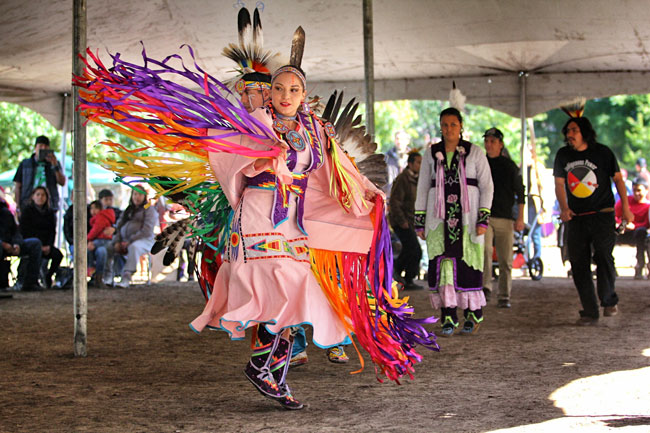
Aboriginal Awareness Week to focus on past while looking ahead to the future
By Neale McDevitt
Entering this, its fifth year, Indigenous Awareness Week (Sept. 21 – 25) has finally reached the kind of status organizers dream about. “People know about it and they look forward to it every year,” says Allan Vicaire, Indigenous Education Advisor, in the Social Equity and Diversity Education Office (SEDE). “We have grown from about 240 participants in the first Indigenous Awareness Week to over 600 last year. Our challenge now is to keep improving it and help it grow.”
This year, the Week kicks off a little early, with the annual Pow Wow on Lower Campus running from 11 a.m. – 4 p.m. on Friday, Sept. 18. A campus mainstay now in its 14th year, the Pow Wow highlights traditional dancing, throat singing and drumming and is an excellent opportunity to browse artisan vendors, learn about student groups, and connect with Indigenous organizations. “Sometimes we have the Pow Wow at the end of the Week,” says Vicaire, “but I like it at the beginning because it really jump starts everything.”
For the first time in its history, Indigenous Awareness Week has two specific themes, and both are very topical.
A series of lectures and panel discussions will focus on the Truth and Reconciliation Commission (TRC). This will include a visit from Dr. Marie Wilson, one of the TRC’s three commissioners. Wilson will deliver the keynote address as part of the opening ceremonies on Sept. 21. “Dr. Wilson travelled from coast to coast as commissioner meeting with people and listening to survivors’ stories,” says Vicaire. “She will give a firsthand account of what the TRC is, how it came about and how we can work together to move forward.”
The second theme will explore Indigenous women’s issues, with a focus on gendered violence. “The issue of missing Indigenous women is a real election issue,” says Vicaire. “The Conservatives say there will be no formal inquiry into missing and murdered Indigenous women, while the other major parties say that, if elected, they will have one.
“We want to look the causes of violence against Indigenous women and its relationship to residential schools and the Indian Act,” says Vicaire. “But we also want to discuss mobilizing the community and grassroots organizations in order to address this problem.”
Not all the events and activities will fall under these themes, however. The ever-popular Dreamcatcher making workshops will give McGill students, staff and faculty the chance to explore their creative side and discover this First Nations traditional craft. As well, the dancing workshop will give participants the opportunity to experience some First Nation traditional dancing first-hand. There will also be three film screenings and assorted other lectures and workshops.
Vicaire hopes that people will come out to at least some of the events, noting that there are activities at different times of the days in order to fit everyone’s schedule.
“Indigenous Awareness Week really overlaps with the TRC – especially when we talk about reconciliation,” says Vicaire. “The first step toward reconciliation is to bring Aboriginals and non-Aboriginals together and acknowledge the past. Once people are engaged they can begin to develop an understanding which will encourage us to build a future together.”
Indigenous Awareness Week; Sept. 21 – 25. Many activities have limited places and require registration. Get the full schedule and reserve your places.
Annual Pow Wow; Sept. 18; 11 a.m. – 4 p.m. on Lower Campus. Get more information.
